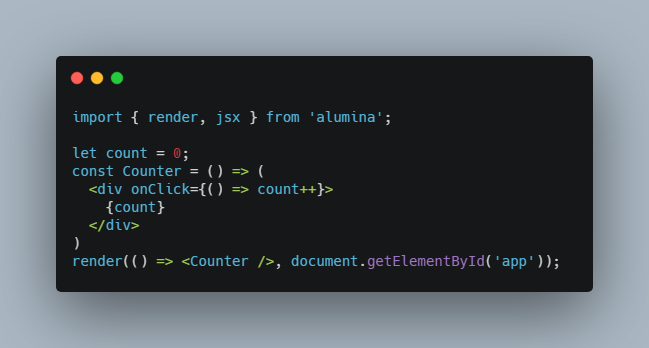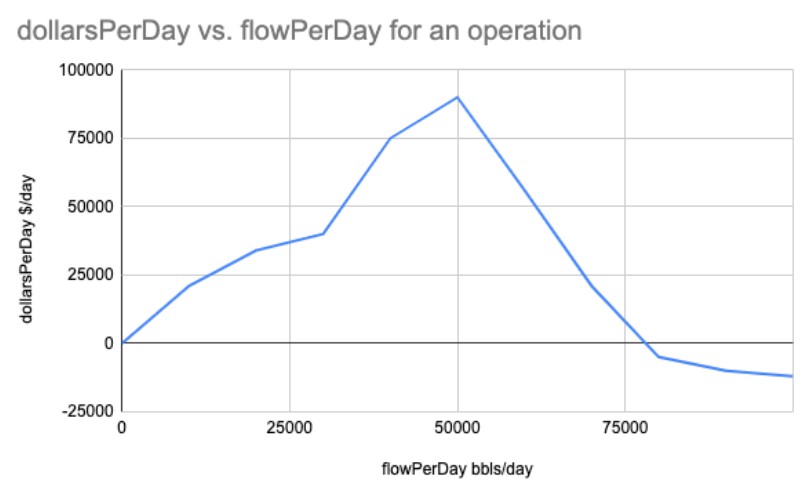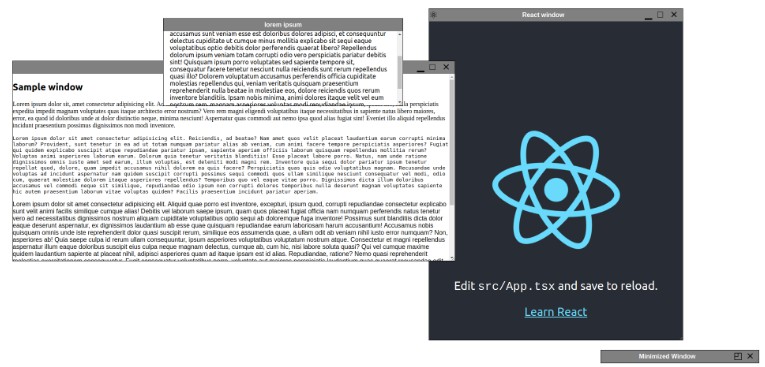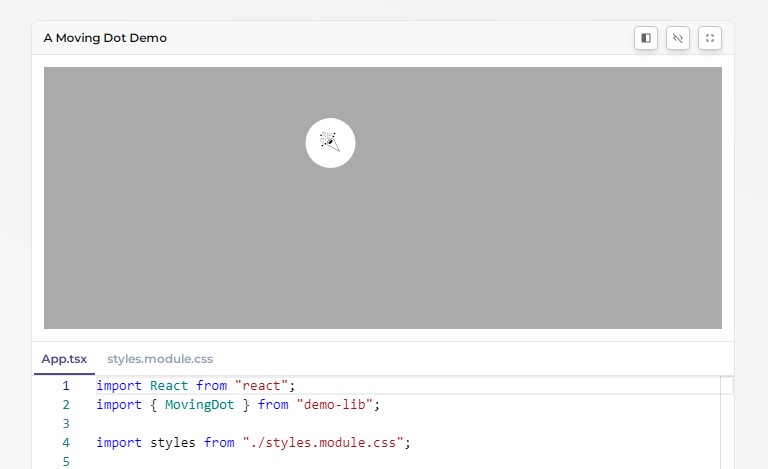About
Alumina is a react-like small UI framework. It aims to rapid and easy development for small applications.
In order to make the state management easier, it adopts the scheme whole virtual dom tree reconciled after each user interaction.
Due to that approach, you can write the store or model without complex state management libraries.
Usage
Install
npm install alumina
Configurations
There are configuration example projects for typescript and well-used bundlers under ./example-packages in this repository. Please check them for the reference.
Basic Examples
Hello world
import { render, jsx } from 'alumina';
const App = () => (
<div>
hello world
</div>
);
render(() => <App />), document.getElementById('app'));
Counter
import { render, jsx } from 'alumina';
let count = 0;
const Counter = () => (
<div onClick={() => count++}>
{count}
</div>
)
render(() => <Counter />, document.getElementById('app'));
Counter (with class model)
import { render, jsx } from 'alumina';
class CounterModel {
count: number = 0;
increment = () => {
this.count++;
};
}
const counterModel = new CounterModel();
const Counter = () => {
const { count, increment } = counterModel;
return <div onClick={increment}>{count}</div>;
};
render(() => <Counter />, document.getElementById('app'));
Counter (with vuex like state management)
import { render, jsx } from 'alumina';
const state = {
count: 0,
};
const getters = {
get countDouble() {
return state.count * 2;
},
};
const actions = {
increment() {
state.count++;
},
reset() {
state.count = 0;
},
};
const Counter = () => {
const { count } = state;
const { countDouble } = getters;
const { increment, reset } = actions;
return (
<div>
<div>count: {count}</div>
<div>x2: {countDouble}</div>
<div>
<button onClick={increment}>add</button>
<button onClick={reset}>reset</button>
</div>
</div>
);
};
render(() => <Counter />, document.getElementById('app'));
The state management part doesn’t depend on how the view updated.
You can design your store with free ideas!
More examples with Hooks
Extract
Counter (with useState)
import { jsx, useState } from 'alumina';
const Counter = () => {
const [count, setCount] = useState(0);
const increment = () => setCount((prev) => prev + 1);
return (
<div onClick={increment}>
<p>{count}</p>
</div>
);
};
Make a local state by useState, same as of React.
Counter (with useLocal)
import { jsx, useLocal } from 'alumina';
const Counter = () => {
const state = useLocal({ count: 0 });
const increment = () => state.count++;
const reset = () => (state.count = 0);
return (
<div>
<div>{state.count}</div>
<button onClick={increment}>add</button>
<button onClick={reset}>reset</button>
</div>
);
};
useLocal() is an original hook function introduced to alumina.
It takes an initial value object as an argument.
You can mutate it’s member directly.
import { jsx, useLocal } from 'alumina';
const createClosureModel = () => {
const state = { count: 0 };
const increment = () => state.count++;
const reset = () => (state.count = 0);
return { state, increment, reset };
};
export const Counter = () => {
const { state, increment, reset } = useLocal(createClosureModel);
return (
<div>
<div>{state.count}</div>
<button onClick={increment}>add</button>
<button onClick={reset}>reset</button>
</div>
);
};
useLocal() also accepts object initializer functions. Closures can be used as local state management store.
Usage Notes
Async Update
Alumina automatically updates the view after every DOM callback functions (such like onClick, onMouseMove, …etc). However for other cases, especially for async function call, rerender() function should be invoked explicitly to update the view.
import { jsx, rerender } from 'alumina';
const store = {
message: 'hello',
};
const changeMessageAsync = () => {
setTimeout(() => {
store.message = 'world';
rerender(); // manually trigger rendering
}, 1000);
};
const App = () => {
return (
<div onClick={changeMessageAsync}>
<p>{store.message}</p>
</div>
);
};
Hooks
Alumina provides following hook functions compatible to React Hooks.
- useState
- useMemo
- useCallback
- useEffect
- useRef
CSS in JS
There is a built-in css in js implementation.
css() function takes css styling string literal and return a className.
import { css, jsx } from 'alumina';
const Hello = () => (
<div
class={css`
border: solid 1px red;
font-size: 20px;
font-weight: bold;
`}
>
hello inline css
</div>
);
styled() can be used to create an element with attached style.
import { styled } from 'alumina';
const StyledCard = styled.div`
border: solid 1px blue;
border-radius: 10px;
width: 100px;
height: 100px;
`;
applyGlobalStyle() is used to declare page global styles.
import { applyGlobalStyle } from 'alumina';
applyGlobalStyle(css`
* {
box-sizing: border-box;
margin: 0;
padding: 0;
}
html,
body,
#app {
height: 100%;
}
`);
Repository structure
. ├── base-packages │ ├── alumina │ └── alumina-remake ├── example-packages │ ├── app_js_webpack │ ├── app_ts_estrella │ ├── app_ts_parcel2 │ ├── app_ts_webpack │ └── app_ts_webpack_jsx_runtime ├── package.json ├── readme.md ├── tsconfig.json └── yarn.lock
This repository contains the core implementation of alumina and minimum example projects for various front-end development environments.
| package | detail |
|---|---|
| ./base-packages/alumina | package published to npm |
| ./example-packages/* | example project setup projects |
Background
Alumina is originally developed for the insourcing UI framework for Kermite.
License
MIT license.





